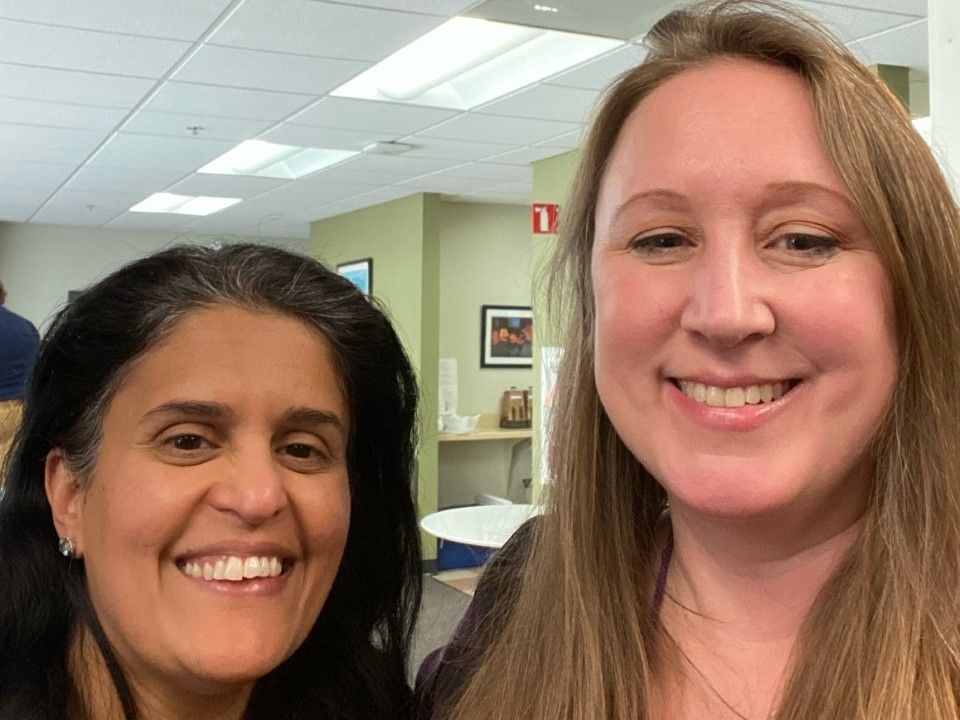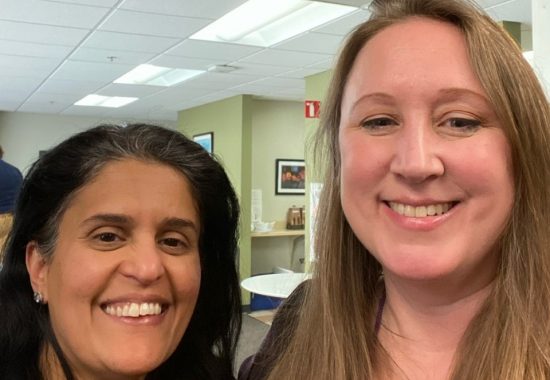
Malathi Thothathiri, PhD, of George Washington University and Erica Middleton, PhD, of Moss Rehabilitation Research Institute
Erica Middleton, PhD, of Moss Rehabilitation Research Institute (MRRI) and Malathi Thothathiri, PhD, of the George Washington University (GWU) have a longstanding history of working together. The two scientists had the good fortune to not only be contemporary postdoctoral fellows under the mentorship of MRRI emeritus Myrna Schwartz, PhD, but they shared an office as well when MRRI was housed at the Einstein facility at Tabor Rd. in Philadelphia. Dr. Middleton reminisced, “I remember getting to know Malathi and all about her family in India during our postdocs. One time, she brought me a fantastic black tea from one of her trips to see her family. She was a great office mate.” Dr. Thothathiri added, “Erica and I had fun talking about all kinds of things from food to philosophy in between work. What was nice was the seamless blending of the personal and professional. I enjoyed meeting Erica’s dog Louie, who in addition to being a great dog was also a great soccer goalie.” Fast forward fourteen years, and Drs. Thothathiri and Middleton are overseeing multiple studies conducted at MRRI, supported by a NIH grant award to GWU and MRRI.
The goal of the research is to test how cognitive control affects sentence comprehension in healthy adults and patients with aphasia. Cognitive control involves regulating your behavior, to meet the specific goals of a given context, including understanding one another in a social interaction. Aphasia is a disorder that affects one’s ability to speak and sometimes understand language, and it is common after a stroke. The research seeks to clarify how cognitive control deficits outside of language comprehension impact the ability of people to interpret sentences. The findings will guide future research on alternative ways to treat language and communication disorders.
In a prior study contrasting two people with aphasia with sentence comprehension impairments, Drs. Thothathiri and Middleton found that each presented with a different reason for their comprehension problems. Multiple measures, including eye tracking and electrophysiological brain recordings, converged to show that one participant had impaired functioning in linguistic cognitive control, whereas the other experienced difficulty because of an overreliance on the meanings of the words at the expense of computing syntax. The identification of distinct underlying problems points to different potential treatment paths for patients who have similar clinical presentations.
Dr. Thothathiri brings to the project her excellent quantitative and methodological skills and expertise in cognitive control, and Dr. Middleton is an internationally recognized expert in designing and conducting studies with people with aphasia from stroke. Drs. Thothathiri and Middleton plan to leverage MRRI’s resources as they prepare a submission for a renewal of the R01 grant award. Dr. Middleton shared, “We’ll be tapping our MRRI colleagues to give feedback on our grant proposal. In this next cycle, we plan to conduct foundational work to begin to translate the findings in the first cycle to address real clinical problems that people with aphasia and their therapists face, including designing different treatment solutions for different individuals. The scientists at MRRI are among the best out there for helping design translational research going from basic scientific findings to clinical application.”
Collaborative projects such as this one allow leading researchers at MRRI and other institutions across the country and around the world to combine their strengths to make meaningful advances in neurorehabilitation.


One comment on “Collaborative Research at MRRI Will Inform the Development of New Treatments for Aphasia”